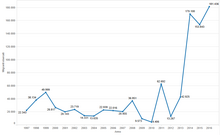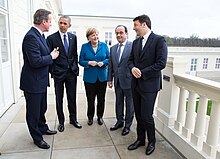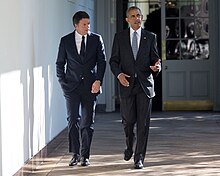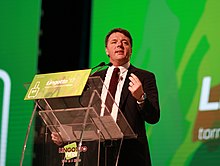Matteo Renzi
He studied in Florence at the classical lyceum (liceo classico) Dante Alighieri, where he passed his final exam with the grade of 60/60 but was nearly expelled because, as the students' representative, he refused to withdraw a school newspaper in which there was criticism of a maths teacher.
[27] In 1994, he participated as a competitor for five consecutive episodes in the television program La Ruota Della Fortuna (a localised version of the United States game show Wheel of Fortune) hosted by Mike Bongiorno, winning Lit.48 million.
[39] During this time, he began to be strongly criticised by other members of his party closer to then-PD secretary Pier Luigi Bersani,[40][41] after his suggestion that Italian politicians of the same generation as then-Prime Minister Silvio Berlusconi should retire.
[60] He was supported by a number of his former political opponents, such as former party secretaries Walter Veltroni and Dario Franceschini, deputy Marina Sereni, member of the European Parliament David Sassoli, and Turin mayor Piero Fassino.
Minutes after the party backed the Renzi proposal by 136 votes to 16, with two abstentions, Palazzo Chigi, the official residence of the Prime Minister, announced that Letta would travel to the Quirinale the following day to tender his resignation to President Giorgio Napolitano.
[97] His rise to become the PD's secretary and eventual prime minister was seen as a sign of much-needed generational change;[98][99] at the time he took office, Renzi enjoyed by far the highest approval rating of any politician in the country.
[101] On 7 February 2015, after just under a year in power, five senators and two deputies from the SC defected to the PD, citing the leadership of Renzi as Prime Minister as the primary reason for their decision to change parties.
[126] German chancellor Angela Merkel, who was visiting Milan and had been among the most vocal politicians regarding Italy's need for speedy economic reforms, said the labour law marked an "important step" to reduce "employment barriers" in the eurozone's third-largest economy.
[140] In April, as part of his wider industrial reforms, Renzi forced the chief executives of Italy's biggest state-owned companies, including Eni, Terna, Finmeccanica, Enel, and Poste italiane, to resign, citing a lack of public confidence in their leadership.
[143] On 1 August, Renzi launched a law decree called Unblock Italy, which was intended to facilitate the implementation of major projects, civil works, and infrastructure that were suspended at the time, and achieve further administrative simplification.
[157] Additionally, Renzi raised the threshold for cash payments three times with the intention to boost the economy, promising that it would not help tax evasion, and described it as "a simple, fair, and liberal measure" that "simplifies" and "encourages consumption".
[162] In October 2016, the Renzi government's proposed 2017 Finance Bill, an expansionary budget including deficit raising to cope with the earthquake and migrants emergencies, was seen as an increasing anti-Brussels rhetoric, having warned of disaster if it was rejected.
To approve the new electoral law, which was opposed by the M5S and a minority of the PD, Renzi gained the support of Berlusconi, who was still the leader of Forza Italia (FI), despite having been expelled from the Senate due to his sentence for tax evasion.
[227] During a press conference on 3 September 2014, Renzi announced an online consultation with students, teachers, and citizens ahead of the major school reforms promoted by education minister Stefania Giannini.
A key ally of Renzi in the Mediterranean was Egyptian president Abdel Fattah el-Sisi; the two leaders held many bilateral meetings where they discussed the problem of immigration to Italy and the increasing tensions in the Middle East and North Africa.
[280] In October 2015, the Italian government announced that it would prolong its military presence in Afghanistan along with the United States Army in order to continue its security mission and prevent the rise of Islamist forces such as Al-Qaeda and ISIL.
[309] On 24 July, under the direction of Foreign Minister Federica Mogherini, the government worked for the release of Mariam Yahia Ibrahim Ishag, a Sudanese woman had been who sentenced to death for being a Christian.
[328] Ahead of the bilateral meeting, Prime Minister Renzi visited and laid flowers at the Moscow bridge, near the Kremlin, on which the Russian opposition leader Boris Nemtsov was murdered a few days before.
[351] During the 69th United Nations General Assembly on 23 September, Renzi held a bilateral meeting with the Turkish president Recep Tayyip Erdoğan, at which they discussed climate change and increasing tensions in the Middle East.
[353] On 8 January 2015, Renzi made his first official trip of the year, meeting with Crown Prince Mohammed Bin Zayed Al Nahyan in Abu Dhabi to address issues of foreign and economic policy, including the Alitalia-Etihad Airways deal.
Emiliano was an outspoken former magistrate with strong support in the poor South expected to join the dissidents in MDP but decided instead to challenge Renzi from within the mainstream party;[394] he is often described as a democratic socialist and populist politician.
After the re-election as secretary, Renzi proposed a new electoral law called Mattarellum bis, better known as Rosatellum,[403] from the name of his main proponent Ettore Rosato, PD leader in the Chamber of Deputies.
[410] The PD's electoral programme for the 2018 Italian general election included,[411][412][413] among the main points, the introduction of a minimum hourly wage of €10, a measure that would affect 15% of workers, that is those workers who do not adhere to the national collective agreements; a cut of the contributory wedge for permanent contracts; a relocation allowance and an increase in subsidies for the unemployed; a monthly allowance of €80 for parents for each minor child; fiscal detraction of €240 for parents with children; and the progressive reduction of IRPEF and IRES rates, respectively the Italian income tax and the corporate tax.
During the National Assembly of the PD on 29 January, Renzi officially announced that he would endorse Sergio Mattarella, a judge on the Constitutional Court of Italy and a former Minister of Defence, as his candidate for the Italian presidential election to replace Napolitano.
Despite the risk this strategy involved, centrist parties announced at the last moment that they would support Mattarella on the fourth ballot, and he subsequently won the presidential election with 665 votes out of 1,009 from senators and deputies.
[461] Renzi led a centre-left coalition composed by the Democratic Party (PD), the liberal More Europe of Emma Bonino, the centrist Popular Civic List of Beatrice Lorenzin, and the progressive Together of Giulio Santagata.
[462] The centre-left was affected by a political schism, when many members of PD's left-wing faction, like Bersani, D'Alema, and Speranza, left the party founding another movement, known as MDP, which run under the joint list Free and Equal led by Pietro Grasso.
[475] For this, Renzi was criticised by the participants of the Family Day, an anti-LGBT demonstration which took place three times in Italy; the Prime Minister was accused of having changed his opinion about the recognition of same-sex couples.
As a "master of telepolitics", Renzi used his own skills and accomplishments as evidence of his ability to lead, promoted the Internet as a platform for democracy, and used heavy emotional appeals along with relatable, persuasive language to advocate for his positions.
[491][492][493] This comparison surfaced in the media again in June 2015, when a phone conversation from January 2014 between Renzi and a general of the Guardia di Finanza, Michele Adinolfi, was leaked to Il Fatto Quotidiano.































